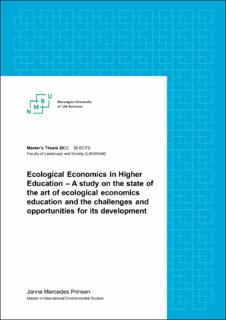| dc.description.abstract | Ecological economics offers alternatives in response to the perceived failure of mainstream economics to address global environmental challenges. This paper studies the state of the art of ecological economics in education. The assessment outlines the core concepts, theories, and methods taught in the field, discusses elements that are considered relevant for a full degree, and classifies the challenges and opportunities for future development of ecological economics education. A multi-method approach was used, including: i) a systematic search for books on ecological economics, ii) systematic and manual searches for programs, courses, and teaching materials, and iii) semi-structured qualitative interviews with scholars and teachers in the field.
The results show that ecological economics education is centered in Europe and North America and often takes place outside of economics faculties. Ecological economics courses and degrees cover many topics (243), yet some foundational concepts to ecological economics are discussed minimally, for example uncertainty, incommensurability of values, and substitution of capital. There is a large degree of variability in the teaching materials used. Furthermore, there is an inconsistency between the wishes of scholars regarding a curriculum, and the education that currently exists. Main challenges identified can be categorized in institutional, political, and internal challenges. Most important challenges include: struggles within interdisciplinary research and education in ecological economics, the dominance of mainstream economics at universities, and the breadth of, and disagreements within, ecological economics. Steps that can be taken by scholars to progress ecological economics education include: i) increase use of alternative teaching materials and styles of teaching, ii) create a database of teaching materials, iii) provide students with action-based education through engaging with local society and creating partnerships, and iv) engage in academic politics.
It is hoped that this paper can serve as a solid basis for articulating the field further in higher education.
Keywords: University Education, Ecological Economics Curricula, Teaching Materials, Ecological Economics Teaching, Expert Opinions, Economics Education. | |
